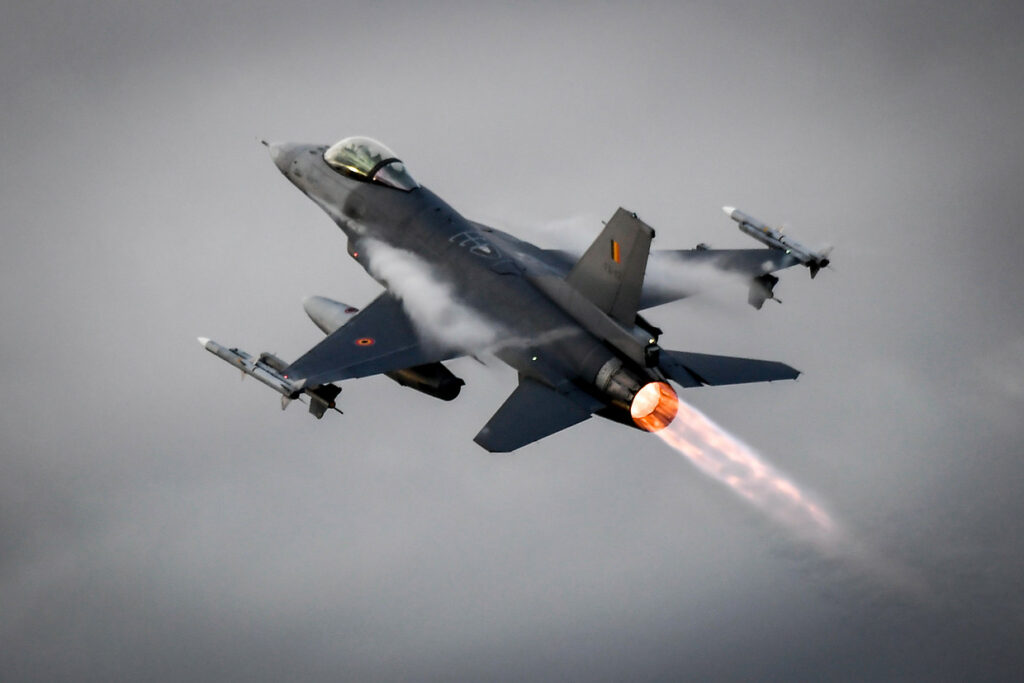8 September will mark a significant milestone for the Belgian Air Force as its first F-16 jet (registration FA-95) retires after logging 8,000 flight hours, Het Belang van Limburg reports.
The aircraft will make its final flight during the Belgian Air Force Day in Kleine-Brogel, before being repurposed as a training tool for student mechanics.
Despite its age, the F-16 jet remains in excellent condition. Major Gregory De Koninck, Squadron Maintenance Commander, praises the aircraft, stating that it has been "a reliable machine, which is why it reached its 8,000-hour mark so quickly."
Why retire now?
Given the relatively satisfactory condition of the aircraft, some have questioned the need for the jet to be retired. Colonel-Flyer Koen Vanheste, base commander of Kleine-Brogel, explains that the 8,000-hour limit is set by Lockheed Martin, the manufacturer of the jet.
"In aviation, there's no room for error. Once an aircraft surpasses its certified flight hours, it's no longer deemed safe for operation," Vanheste said. He also noted that each flight hour requires ten man-hours of maintenance work, making the upkeep very labour-intensive.
The 8,000-hour limit was a point of contention in the Federal Parliament, particularly during discussions about replacing the F-16s with F-35s. Some argued that the F-16s could continue flying with updates but Lockheed Martin clarified that such an overhaul would cost billions, not millions. Ultimately, Belgium opted for new aircraft.

The F35-A fighter jet in Fort Worth, Texas. Belgium ordered 34 examples of Lockheed Martin's F-35 for some €3.8 billion in October 2018. The craft will initially be stationed at Luke Air Force Base (AFB), near Phoenix, Arizona, where 48 Belgian Air Force pilots will undergo initial training. Credit: Lockheed Martin Corporation
Belgium is set to receive a new inventory of modern F-35 jets. This acquisition has proven to be extremely costly and controversial. At the start of August, Belgium refused receipt of two of its new F-35A aircraft, chiefly due to technical deficiencies relating to software and heads-up displays.
The Ministry of Defence originally calculated that the F-35 project would pay for itself, generating almost the same income as the €3.8 billion sticker price from the industry that will help maintain them. This has now been proven to be false, instead costing the taxpayer around €3.1 billion.
The air force remains reliant on its F-16 jets, which it uses to protect Belgian airspace, especially from potential incursions from Russian aircraft, as well as on missions to defend NATO’s external borders.
No plans to supply Ukraine
The retiring F-16 jet has a rich operational history, having been deployed in Kosovo, Libya, Afghanistan, Syria, Iraq, and the Baltic states. It is also the first F-16 to reach retirement age among the European Participating Air Forces (EPAF) countries – Belgium, the Netherlands, Denmark, Norway, and Portugal – who had updated their F-16 fleets in the 1990s.
Belgium has ruled out supplying F-16s to Ukraine, citing the need to maintain its existing fleet. "We still need our F-16s," said Minister Dedonder. Other experts have said that Belgium is refusing to send F-16s for fear of escalating tensions with Russia further.
Related News
- The Hague welcomes US green light for F-16 deliveries to Ukraine
- Two Russian bombers intercepted in North Sea en route to Dutch airspace
The transition to the F-35 will be gradual, with the new jets arriving in Florennes in 2025 and in Kleine-Brogel in 2027. "The F-16s will have limited deployment until the end of 2028," Vanheste added.
Belgium originally purchased 160 F-16s. "We've lost 39 over the years, sold 25 to Jordan, and some were scrapped due to budget constraints," Vanheste said, expressing regret at the sight of the decommissioned aircraft.
As for FA-95, it will receive a specially painted tail wing to commemorate its 8,000 flight hours, giving it a well-deserved farewell as it transitions to its new role in training the next generation of mechanics.

